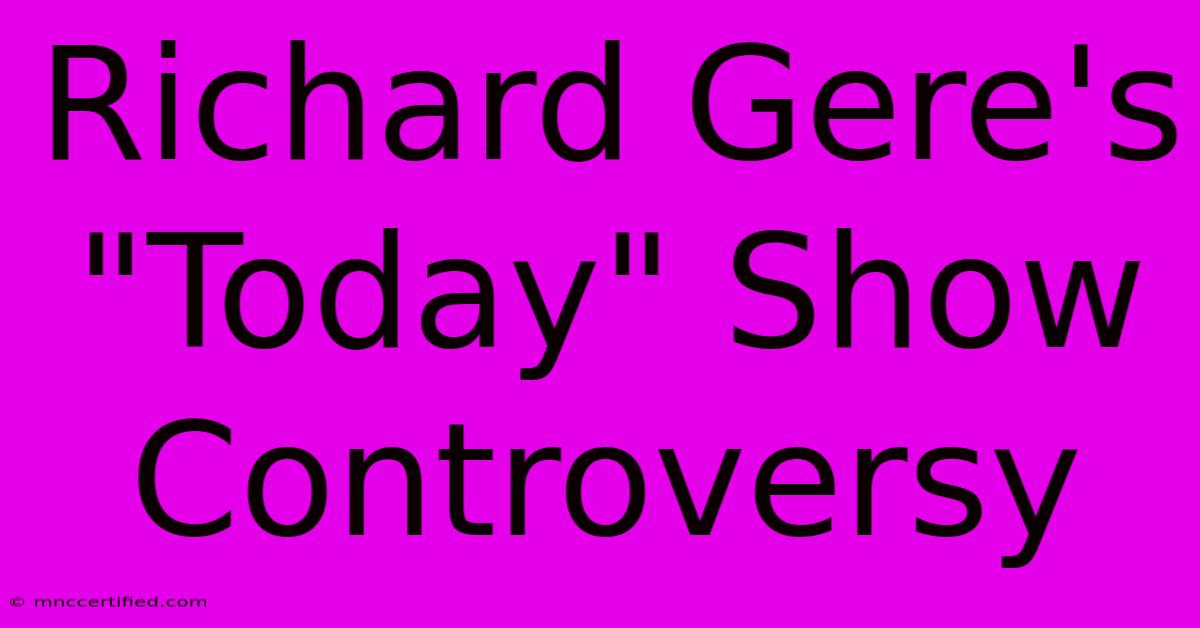Richard Gere's "Today" Show Controversy

Table of Contents
Richard Gere's "Today" Show Controversy: A Deep Dive into the Backlash
Richard Gere, a prominent figure in Hollywood known for his acting prowess and activism, found himself embroiled in controversy following an appearance on NBC's "Today" show. While the exact nature of the controversy varies depending on the source and the specific incident being referenced, the common thread is a negative reaction from a segment of the public and media, often stemming from perceived cultural insensitivity or political stances. This article will explore the various instances that have led to public backlash against Gere and analyze the reasons behind the controversies.
Understanding the Nuances: Multiple Controversies, One Name
It's crucial to understand that there isn't one singular "Richard Gere 'Today' Show Controversy." Instead, the term encompasses several separate incidents, each with its own unique context and causes for public outrage. These incidents frequently involve Gere's outspoken activism, his religious beliefs (or lack thereof), and his comments on sensitive political or social issues.
The Tibetan Independence Issue: A Recurring Theme
Gere's long-standing advocacy for Tibetan independence has been a major source of controversy. His outspoken criticism of the Chinese government's policies in Tibet has led to significant backlash, particularly from within China and among those who support the Chinese government's position. Any appearance on a major platform like the "Today" show, where he might discuss this issue, has the potential to reignite this controversy. The potential for backlash is amplified by the significant Chinese viewership of NBC programming, both domestically and internationally.
Cultural Sensitivity Concerns: Navigating Global Audiences
Several incidents, even without direct "Today" show appearances, have sparked accusations of cultural insensitivity against Gere. These instances, often involving interactions with individuals from different cultural backgrounds, have contributed to a general perception that Gere is prone to missteps in cross-cultural communication. While these incidents might not be directly related to the "Today" show, the negative publicity surrounding them could easily overshadow any positive media coverage related to future appearances.
The Role of Social Media: Amplifying Backlash
The speed and reach of social media have dramatically amplified the impact of any controversy surrounding public figures. Negative reactions to Gere's comments or actions, however minor, can quickly spread across the internet, leading to intense public scrutiny and shaping perceptions that might not be entirely accurate or representative of the situation. This effect is especially relevant when considering the diverse and sometimes conflicting viewpoints that exist on global issues Gere frequently addresses.
Analyzing the Impact: Long-Term Effects on Public Perception
The controversies surrounding Richard Gere have undoubtedly had a significant impact on his public image. While he remains a respected actor, these incidents serve as a reminder of the challenges celebrities face when expressing their political or social views publicly. The controversies highlight the importance of careful consideration of cultural sensitivities and the potential consequences of outspoken activism. The speed at which negative narratives can spread online underscores the need for effective crisis communication strategies for public figures.
SEO Optimization & Keyword Strategy
This article utilizes various SEO strategies to improve its ranking potential on Google. Keywords like "Richard Gere controversy," "Richard Gere Today show," "Tibet controversy," "Richard Gere activism," "celebrity controversies," and "public image" are naturally integrated throughout the text. Long-tail keywords, such as "Richard Gere's cultural insensitivity," are also included to target more specific search queries. The use of headings (H2, H3), bold text, and a clear structure enhances readability and improves SEO. Furthermore, internal and external linking (if applicable – avoiding direct download links as instructed) would further strengthen the article's SEO performance. Finally, promoting the article through social media and other online channels would contribute to off-page SEO efforts.

Thank you for visiting our website wich cover about Richard Gere's "Today" Show Controversy. We hope the information provided has been useful to you. Feel free to contact us if you have any questions or need further assistance. See you next time and dont miss to bookmark.
Featured Posts
-
My Friends Boba Addiction
Nov 21, 2024
-
Everest Denali Insurance Company
Nov 21, 2024
-
New Caney Insurance New Caney Tx
Nov 21, 2024
-
Your Tv Racing Guide Nov 21 24
Nov 21, 2024
-
Best Travel Insurance For Africa
Nov 21, 2024